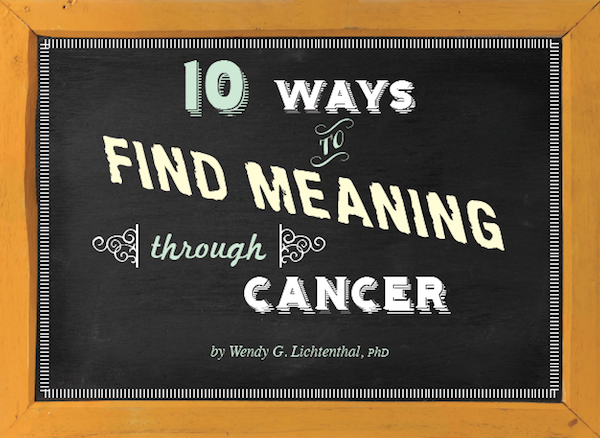10 Ways to Find Meaning through Cancer
by Wendy G. Lichtenthal, PhD
Following a cancer diagnosis, many individuals report that their desire to live authentic and meaningful lives is heightened. Yet survivors often struggle with an altered sense of identity and meaning, feeling different and disconnected. While not everyone with cancer has these types of concerns, it’s important to develop a toolbox that you can tap into as needed. If you are living with cancer, here are 10 ways to find meaning in your illness and in your life.
1. Validate your experience.
Before you embark on a search for meaning, acknowledge any distress you may be having. Living with cancer is not easy, and it’s normal to experience difficult emotions. Give yourself permission to feel, and be compassionate toward yourself.
2. Know that you have a choice in how you create meaning.
In his book Man’s Search for Meaning, psychiatrist Viktor Frankl highlighted that when facing life’s limitations, we have the freedom to choose our attitude about how we face a given situation. We can decide if it’s a good or bad thing, a situation from which we are beaten or something over which we triumph. How you decide to face a given situation can be a source of meaning or even pride.
3. Nurture your meaning-making system.
Meaning is made through our beliefs about ourselves, about others, and about how we think the world works. Our beliefs about our ability to handle things greatly affect our experience of them. If you have entered the cancer experience believing you aren’t able to handle it, remind yourself of the challenges you’ve already faced and how you got through them. Look at the difficult moments you’ve had since your diagnosis, and give yourself credit for managing what may have been very challenging emotions.
4. Revise the meaning of cancer.
Not only are beliefs about our ability to cope important, but beliefs about what the cancer means (such as viewing it as a punishment) can have a great influence too. Acquiring a different perspective of your cancer is not meant to promote “turning lemons into lemonade” (although some people think about it this way), but rather to acknowledge the power you have to define an event in your life. So ask yourself, have you learned anything important through your cancer experience? Has it affected your values or priorities?
5. Be the author of your story.
It is human nature to want to make sense of unexpected life events; therefore, “Why me?” is a natural response. But you (and you alone) are the author of your story. How do you want your story to unfold? What is the title of this chapter in your life? Find a way to make this experience fit into your life’s story.
6. Consider your valued sources of meaning.
What makes you want to get out of bed each morning? Is it a special relationship? Someone you love? A cause about which you are passionate? A beautiful sunrise? Powerful music? Have you lost touch with these things since your diagnosis? Reconnect with your sources of meaning, maybe even in new ways. For example, a teacher who is no longer teaching children in a classroom might find other ways to teach, perhaps by offering guidance to loved ones.
7. Explore and reconnect with what makes you you.
Our roles, traits, relationships, and values define us. How did you define yourself before cancer? If you’ve become disconnected from activities and relationships that remind you who you are, be deliberate about reconnecting with them.
8. Focus on being, not just doing.
If it’s become challenging to do some of the things you were able to do before diagnosis, focus more on just being – receiving the gifts of life, such as love, beauty, and humor – and on creating quiet, meaningful experiences to remind you that you are, in fact, alive.
9. Redefine self-care.
If you define yourself by how you serve others, a cancer diagnosis can be derailing. Consider for whom you are ultimately responsible, and be sure to place yourself at the top of the list. To take care of others, you must first take care of yourself; the “put on your own oxygen mask before you assist others with theirs” metaphor applies here.
10. Don’t underestimate the power of support.
Whether you connect with friends, family, or other cancer survivors, having someone who can listen to your feelings can be invaluable. In addition, a mental health professional can help you reconnect with sources of meaning and explore how you would like cancer to fit into your life using approaches like Meaning-Centered Psychotherapy, which was developed by Dr. William Breitbart and colleagues at Memorial Sloan-Kettering Cancer Center.
While the media often focuses on those who have found meaning and growth after cancer, it’s easy to overlook the fact that there is usually a process (sometimes a lengthy one) that leads to such positive outcomes. If you’re struggling with finding meaning in your life, don’t assume you are alone or that where you are is a permanent state. When so much is beyond your control, the ability to create meaning is something you do have control over.

Dr. Wendy Lichtenthal is an assistant attending psychologist and director of the Bereavement Clinic in the Department of Psychiatry and Behavioral Sciences at Memorial Sloan-Kettering Cancer Center and assistant professor of psychology in the Department of Psychiatry at Weill Cornell Medicine in New York, NY. Her work focuses on developing interventions for people with cancer and their families, with a focus on meaning-centered approaches.
This article was published in Coping® with Cancer magazine, November/December 2020.


